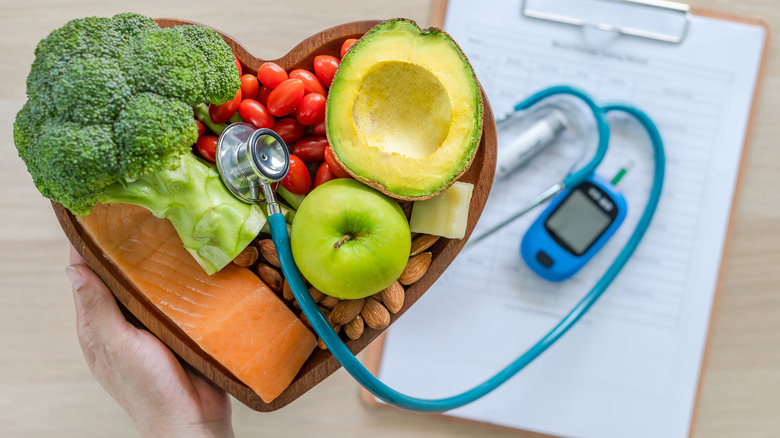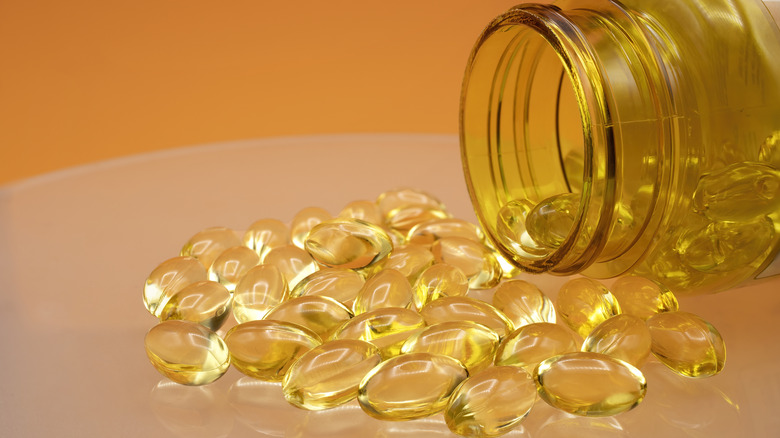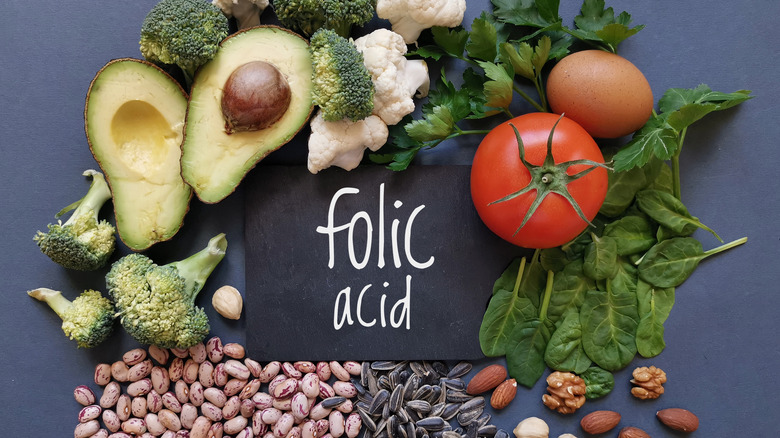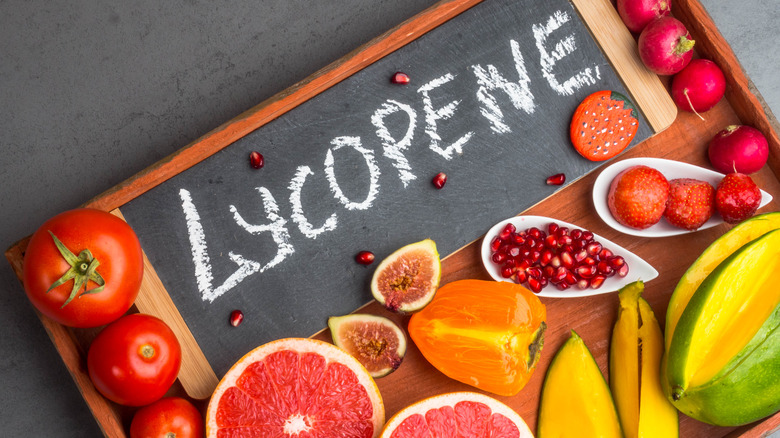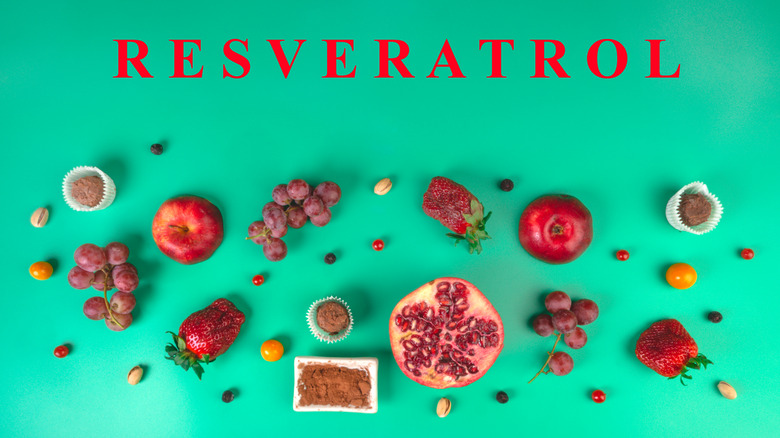The Surprising Nutrients That Will Optimize Your Heart Health
For something that is about the size of your fist, your heart does a lot of work. It pumps about 2,000 gallons of blood throughout your body, delivering it to organs, tissue, muscles, and cells. Electrical impulses stimulate the heart to beat about 100,000 times a day, per WebMD.
You may have noticed that your heart rate goes up and down throughout the day, depending on your level of activity. Your resting heart rate can be anywhere from 60 to 100 beats per minute, but Harvard Health reports that those over 80 were at a greater risk of heart disease.
To improve your heart health, you can exercise more, stop smoking, avoid alcohol, lose weight, learn to manage stress, and get a good amount of quality sleep, according to Medicine Net. Another way is to eat a healthy diet, and we've come up with five nutrients that will optimize your heart health.
Omega-3 fatty acids
Omega-3 fatty acids are polyunsaturated fats, and while there are several types of them, the most important for heart health are eicosapentaenoic acid (EPA), docosahexaenoic acid (DHA), and alpha-linolenic acid (ALA), according to Healthine. EPA and DHA are usually found in fish and fish oils, and ALA is found in plant oils like flaxseed and canola oil, per the National Institutes of Health (NIH).
These fats are good for your heart because they reduce triglycerides in your blood. Triglycerides are a kind of fat stored in your blood, and when there are too many, it can contribute to hardening of the arteries, according to Mayo Clinic. There is no recommended daily intake for omega-3 fatty acids, but the American Heart Association suggests eating one or two serving of fish each week to reap the benefits. If you have heart disease, it's recommended to get about 1 gram of EPA and DHA from supplements (via the NIH).
Folate
Of all the B vitamins, vitamin B9, otherwise known as folate, plays an important role in heart health because it helps reduce the amounts of an amino acid called homocysteine. When the body metabolizes proteins, it creates homocysteine, and high levels of homocysteine in the blood might lead to hardening of the arteries, per Verywell Health. A 2010 study published in the journal Stroke found that high intakes of folate and vitamin B6 were linked with a lower risk of heart disease and stroke. Another 2012 study showed a lower risk of high blood pressure among young people who consumed high amounts of folate, per the American Journal of Clinical Nutrition.
Folate occurs naturally in beef liver, spinach, black-eyed peas, asparagus, Brussels sprouts, romaine lettuce, avocados, broccoli, and mustard greens. The recommended daily intake of folate is 400 micrograms per day for adults, 600 mcg for pregnant women, and 500 mcg for women who are breastfeeding, per Verywell Health.
Vitamin C
When you think of vitamin C, immune health might come to mind but there is evidence that it is good for your heart as well. Vitamin C has plenty going for it, including its ability to build cartilage, muscle, collagen, and blood vessels (per Mayo Clinic).
The antioxidants in vitamin C are what make it a valuable asset to the heart. Science Direct reports that one study conducted by the University of Copenhagen and Herlev and Gentofte Hospital found that high levels of vitamin C from food sources reduced the risk of cardiovascular disease by 15% and early death by 20%. Moreover, the Journal of the American Heart Association reported that vitamin C may also reduce the risk of strokes.
Citrus fruits are rich in vitamin C, but you can also find this nutrient in peppers, broccoli, spinach, cabbage, tomatoes, and berries. Men should get 90 milligrams per day of vitamin C while women should consume 75 mg daily (via Mayo Clinic).
Lycopene
Another antioxidant powerhouse that supports heart health is lycopene. This chemical is what gives red, orange, and yellow fruits and vegetables their color. Like vitamin C, lycopene is an antioxidant, and that quality may help reduce LDL, or the "bad" cholesterol in your blood. LDL cholesterol can stick to the walls of your arteries, which increase the risk of heart disease, per WebMD. In addition, lycopene can raise levels of HDL, or the "good" cholesterol in your blood, according to research published in the American Journal of Clinical Nutrition (via Verywell Health).
Lycopene's antioxidant properties might help your body fight against certain kinds of cancer. It might also reduce the risk of developing macular degeneration and keep your bones stronger, according to Healthline.
Sources of lycopene include tomatoes, including tomato sauce and paste, salsa, and ketchup. You can also find it in watermelon, red peppers, carrots and grapefruit, per Healthline. There is no RDI established for lycopene. That said, Verywell Health suggests 15 milligrams of lycopene daily if you have high blood pressure.
Resveratrol
Resveratrol is another antioxidant that has the added benefit of being anti-inflammatory. Cleveland Health Clinic explains that this combination adds a protective coating around your cells and along the walls of your blood vessels. This coating helps prevent damage that might otherwise occur to cells all over your body, not just in your heart.
When it comes to your heart, however, resveratrol is like other antioxidants, and it can help lower LDL levels and raise HDL levels. Resveratrol is also a polyphenol, and that means that it helps your blood vessels do their job. One of those jobs is reducing the number of clots that form in your blood, which can lead to stroke.
You can find resveratrol in blueberries, cranberries, bilberries, red grapes, pistachios, dark chocolate, peanuts, and peanut butter. Currently, there is no RDI for resveratrol, so it's best to talk with your doctor before taking any supplements (via Livestrong).
